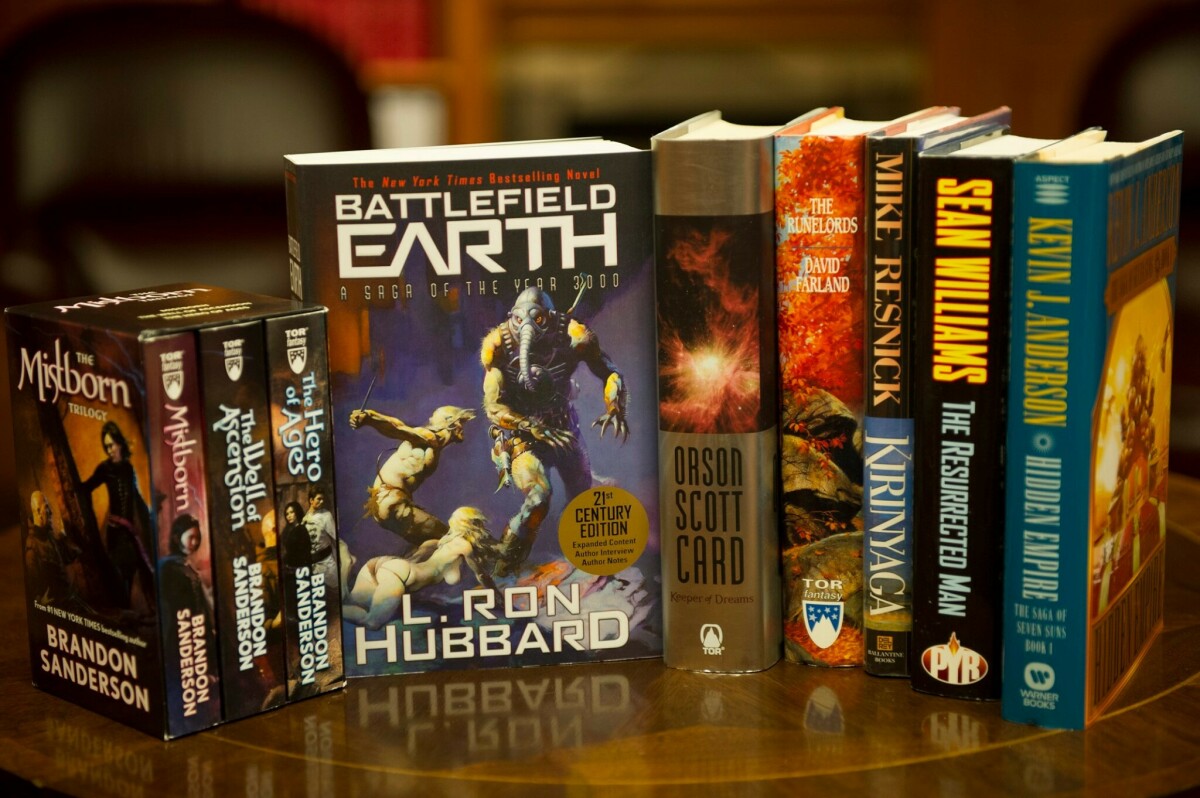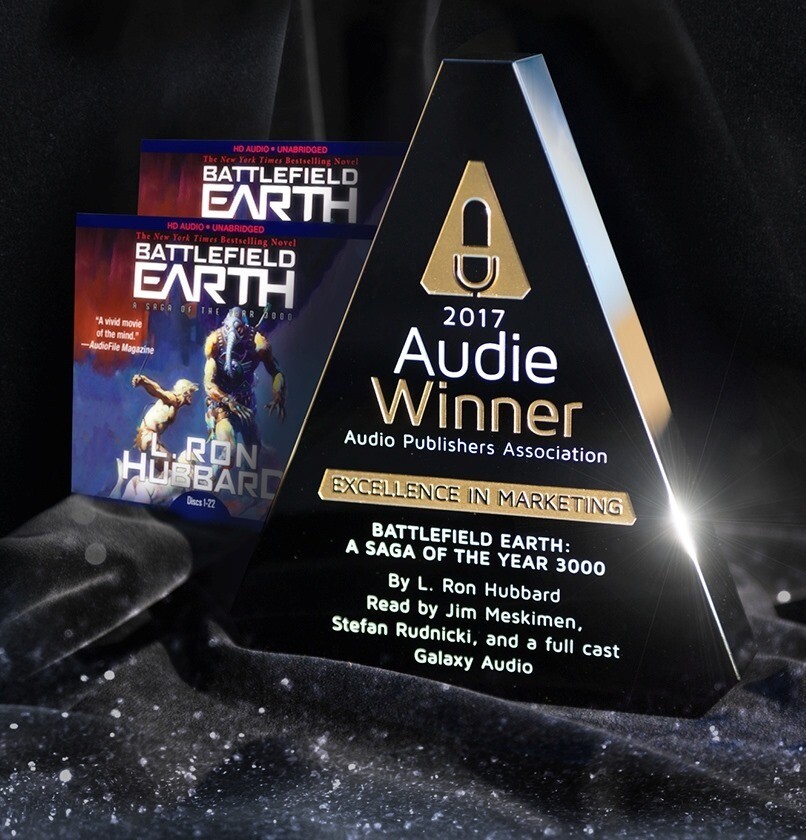Have you read the epic alien invasion novel Battlefield Earth?
This is one of the sci-fi classics like Dune, The Foundation Trilogy, and Ender’s Game. It could even be compared with Star Wars and Star Trek in terms of epic space opera adventure.
This year marks the 40th Anniversary, I want to give it a shout-out.
It is also a major motion picture. You may have heard of it. It is one of John Travolta’s favorite sci-fi books, so he made the movie with Forrest Whittaker and it was directed by Roger Christian. Movies are never as good as the book, but this one has an average of over 3.8 stars on Amazon (not bad!).
I’m giving Battlefield Earth a shout-out. If you liked Dune, Lord of the Rings, Enders Game or the Foundation series, you’ll love it. Brandon Sanderson calls it “a masterpiece,” Neil Gaiman said it’s “un-put-downable,” and it’s a Hugh Howey favorite.

“Pulse-pounding mile-a-minute sci-fi action-adventure that does not stop. It is a masterpiece of popular adventure science fiction.” —Brandon Sanderson (Way of Kings)
“Over 1,000 pages of thrills, spills, vicious aliens and noble humans. Un-put-downable.” —Neil Gaiman (Good Omens)
“A character-driven epic that grabs you from the start and never lets go. A compulsively-readable science-fiction tour de force, complete with breathtaking action, non-stop adventure.” —Douglas E. Richards (Unidentified)
“Battlefield Earth is one of my favorite works of science fiction ever. I’ve probably read it eight times or so. It’s always in my top five. It’s really brilliant.” —Hugh Howey (author of Wool)
“Battlefield Earth is a terrific story! A masterpiece.” —Robert A. Heinlein (Starship Troopers)
“Non-stop and fast-paced. Every chapter has a big bang-up adventure.” —Kevin J. Anderson (co-author of the Dune Sagas)
“With great heroes, battles, wonders, and interstellar intrigue, this is a book that you won’t put down.” —David Farland (Star Wars novels)
INTERVIEW WITH L. RON HUBBARD
Q: What made you return to science fiction writing after all these years?
A: There are some activities that are simply so much fun that one can’t give them up. Writing is that for me. I love every opportunity to write.
Many young writers are told to write in order to learn how to write. That is good advice. I used to find any excuse to write because I loved to do it. If I didn’t have a typewriter, I wrote in longhand.
So when my 50th anniversary as a professional writer came around, I decided to celebrate it by doing it. It was like a present to myself, so to speak.
I chose science fiction because there is great versatility in this genre. (A writer must pick his medium as carefully as a painter must pick his brush and colors.) Besides, science fiction is no longer the stepchild of literature. Star Wars created an entirely new following.…
Plus, look at the bestseller lists and you will see the pattern repeating. Science fiction and space travel is dominant.
Q: How do you draw from your past track in creating character and plot? Is this the place from which science fiction comes in general, whether the writers know it or not?
A: Experience helps any writer or anyone who wants to write.
I traveled through the Far East and sailed the high seas and did a few loops in some bi-winged planes and gliders in my day and drew upon these for stories. I also did a lot of research for other stories.
But what is more important is the ability to see what is in front of you. Plus you have to have the ability to assume the viewpoint of your reader.
For example, in Battlefield Earth, the reader looks through the eyes of the hero and through the eyes of the alien. This is done by describing how each person would describe the scene and objects. It gives the reader a feeling of what it would be like to assume that viewpoint. The reader at first does not recognize the object either but should be able to do so as the description continues. But, in the process, the reader can experience the same mystery as the character in the story.
That is the ability to see what is in front of you and the ability to assume another viewpoint.
It is a good exercise for writers.
So experience is helpful but you need much more.
Q: How do you work? Do you dictate or pound your fiction out on your old typewriter? Do you keep any set schedule when doing a book? Do you work from detailed character sketches and plot outlines or do you wing it? Have your working methods changed over the years?
A: My goodness, but that covers a lot!
What I write determines how I do it. Sometimes I type, sometimes I write longhand and sometimes I dictate.
Battlefield Earth was typed on a manual. The length was about 3,000 pages.
Each day before I went to bed I would sketch out the plot that I would cover the next day. Plus I would list out anything else that I wanted to accomplish.
I do set and follow a schedule when I want to get certain things done in a day—like exercise, if only a walk.
So I generally lay out what I want to accomplish for the day, the week, the month and then I do it. I would say this is perhaps my primary development since those early days in getting organized. It has allowed me to get more accomplished to lay out a schedule and then do it.
Q: What advice do you have for budding writers?
A: Write and write and write and write. And then when you finish, write some more.
It may not be original advice, but it is still quite true. You learn to write by writing.
Don’t try to learn how to write in order to write. I’ve seen a lot of great writers killed off when they decided they wanted to learn how to write.
Just take an idea and go with it. You may find a story that pulls you along. The story takes off on its own. It sounds silly but it happens. You have this character walking down the street and you are all ready for him to get into a taxi but he walks right on and turns into a movie theatre. Whoa! What is this? Well, follow him and see what happens.
The main thing is to write and learn the business of writing—that tough market you have to live with.

Title: Battlefield Earth
Author: L. Ron Hubbard
Genre: Science Fiction
Publisher: Galaxy Press, Inc.
Blurb: Sadistic Aliens…
…Man is an endangered species.
Is it the end of the world or the rebirth of a new one?
In the year A.D. 3000, Earth is a post-apocalyptic wasteland. The great cities stand crumbling as a brutal reminder of what we once were. When the aliens invaded, all the world’s armies mustered little resistance against their advanced weapons.
Now, all that stands between mankind and total extinction is Jonnie Goodboy Tyler—the courageous young warrior determined to rally the scattered tribes of humanity in an all-out battle for freedom.
The fate of the Galaxy lies on the Battlefield of Earth.

About the Author
There are only two tests of a life well lived, L. Ron Hubbard once remarked: Did one do as one intended? And were people glad one lived? In testament to the first stands the full body of his life’s work, including the more than ten thousand authored works and three thousand tape-recorded lectures of Dianetics and Scientology. In evidence of the second are the hundreds of millions whose lives have been demonstrably bettered because he lived. They are the generations of students now reading superlatively, owing to L. Ron Hubbard’s educational discoveries; they are the millions more freed from the lure of substance abuse through L. Ron Hubbard’s breakthroughs in drug rehabilitation; still more touched by his common sense moral code; and many millions more again who hold his work as the spiritual cornerstone of their lives. Learn More
Blog: https://battlefieldearth.com/blog
Book Club Discussion Guide: https://dl.bookfunnel.com/y84enq7cje
Lesson Plan for Teachers and homeschoolers: https://battlefieldearth.com/educators-guide/
Videos: https://battlefieldearth.com/videos/
Facebook: https://www.facebook.com/BattlefieldEarth
Instagram: https://www.instagram.com/be_the_book
Twitter: https://twitter.com/be_the_book
Other books by L. Ron Hubbard: https://galaxypress.com/l-ron-hubbard-books/
Note: Some posts may contain affiliate links. Should you choose to purchase a product, we will receive a small commission for the sale at no additional cost to you. Chapter Break is a participant in the Amazon Services LLC Associates Program, an affiliate advertising program designed to provide a means for sites to earn advertising fees by advertising and linking to Amazon.com.



